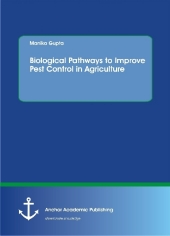 Neuerscheinungen 2017Stand: 2020-02-01 |
Schnellsuche
ISBN/Stichwort/Autor
|
Herderstraße 10
10625 Berlin
Tel.: 030 315 714 16
Fax 030 315 714 14
info@buchspektrum.de |

Manika Gupta
Biological Pathways to Improve Pest Control in Agriculture
2017. 392 S. 177 Abb. 220 mm
Verlag/Jahr: ANCHOR ACADEMIC PUBLISHING 2017
ISBN: 3-9606718-9-X (396067189X)
Neue ISBN: 978-3-9606718-9-3 (9783960671893)
Preis und Lieferzeit: Bitte klicken
India is especially suitable for agricultural products, its vast plains containing alluvial soil with rich natural contents. The major economy of India is based on agricultural products. The green revolution in India brought high hopes for Indian farmers. Several new scientific information helped crop production to grow by leaps and bounds: the more researches, the more intricacies. Further knowledge of pests makes scientists consider several new solutions. The use of chemicals was immediately adopted to decimate the population of pests and, at first, good results were obtained. But later on, harmful effects of the pesticides became known. It was realized later on that the regular use of chemicals in pesticides is extremely dangerous for human health.
Generally, chemical pesticides are used to curb the harmful effects of insects and pests. But the immediate gain of this process has an adverse effect on the environment in the long run. Regular use of chemicals leads to insecticide resistance. Then, biodiversity is distributed by pest resurgence and pesticide residues. So, the immediate gain of one generation creates serious problems for the next generation.
To sustain agriculture towards its natural mode some new solutions are to be traced. The solution to reduce pesticides is present in the preference for biological management. Predators and parasitoids may be used as natural enemies. In order to gain control over the thrips pests by less harmful means for the agricultural crops, more research work needs to be done. Certain other methods have to be explored in favour of the environment, biodiversity and other useful flora and fauna. We need to maintain the tritrophic interactions in which eating relationships between several species may be traced for biological control.
Manika Gupta is a dedicated researcher. During the last three years she taught P.G. classes in the subjects of entomology and zoology. She is specialized in biological control management of chilli thrips with the help of natural enemies in the field of chilli crops. Furthermore, she is a life member of ISCA, the Indian Science Association. She published her research papers in the referred journals of life science. She has attended national and international conferences and presented her research activities there.


